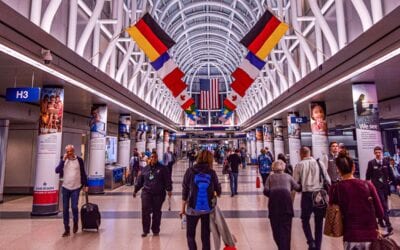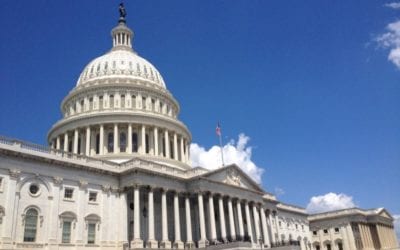
NPRM — Notice of Proposed Rulemaking — is the most important part of American governance that the public has never heard of. In school we all have learned how bills are passed, how the House and Senate must both pass the bill and then the President must sign it before it becomes law. But we don’t learn about the next step — NPRM.
How does this affect air travel? Lost baggage refund rules, denied boarding compensation, full-fare advertising mandate, tarmac-delay limits, air transportation statics, safety regulations and code-sharing agreements all would not be in place without NPRMs.
The NPRM is where the rubber meets the road when it comes to putting laws passed by Congress into effect. Every executive department is tasked with implementing or executing Congress’ will through regulations. Those regulations, for the most part, cannot be put into effect without a notice of proposed rulemaking. Every department from the Department of Transportation to Homeland Security and from the Department of Commerce to the Department of Labor faces a phalanx or rulemakings.
For the public and industry, the NPRM process can be considered even more important than legislation. This is the process where the public has an opportunity to comment on proposed rulemakings. Where many executive departments have found ways to limit full
NPRM activity, the Department of Transportation assiduously follows the steps from announcing an NPRM to taking comments to having it reviewed by the Office of Management and Budgets to releasing the final rule. This is where the public aware of the process can have their voices and concerns heard.
The NPRM process is what the Consumer Travel Alliance is involved with when making comments on rules and regulations as they are being formed. Any citizen or organization, can also participate by reading about upcoming proposed rulemakings in the Federal Register, noting the docket number and them making their thoughts known in comments through www.regulations.gov.
It is an amazingly open procedure that provides for direct citizen involvement. On almost no one knows the process even exits or how to add their voices to the debate.
The Department of Transportation has embarked on a series of passenger protection rulemakings.
Passenger Protections I dealt with tarmac-delays.
Passenger Protections II
– expanded the tarmac-delay rules to more carriers
– required airlines to include customer service plans on their websites
– increased denied boarding compensation
– required advertising to include all mandatory taxes, charges and fees
– mandated that airlines notify consumers of optional fees
– prohibited post-purchase price increases
– ruled that carriers must notify passengers of delays and cancellations in a timely manner
– inform consumers how to file a complaint with the carrier, and provide substantives responses to consumer complaints within 60 days
Passenger Protections III has already been delayed several times, but appears to be on track to be released at the end of May 2013. It will include, among other technical issues, the following passenger protections.
– Expand major airline performance statistic to include regional flights considered part of their network
– Increase the “reporting carriers” to include smaller operators such as Allegiant and Spirit Airlines
– Development of minimum service requirements for travel agents
– Require travel agents and online travel to disclose any incentive payments that might influence their advice on flights
– Better display of extraordinary extra fees such as oversized and overweight baggage
– Prohibit post purchase price increases for ancillary fees after airfares have been purchased
– Disclose all ancillary fees through all sales channels where the airlines choose to sell their flights
Other rulemakings are in the process of being completed that deal with rules for dealing with passengers with disabilities and for revamping the reporting requirements of airlines regarding ancillary fees, lost baggage and delays.
These are the rules that can change a traveler’s experience and affect their compensation when things go wrong during travels. There are still many issues that neither the airlines nor DOT have come to grips with.
Many of those are being debated on the Advisory Committee for Aviation Consumer Protections that will meet four times this calendar year to discuss the upcoming rulemaking and other issues including such as the development of a plain-English airline contract of carriage and customer service plan; displays of posters at airports that detail customer service rules in case of delays, lost luggage and flight cancellations; clarification of which code-share airline is responsible for baggage fees and lost luggage compensation; privacy protections if data held by airlines; refunds of taxes and charges when flights are cancelled; and other issues.

Charlie Leocha is the President of Travelers United. He has been working in Washington, DC, for the past 14 years with Congress, the Department of Transportation, and industry stakeholders on travel issues. He was the first consumer representative to the Advisory Committee for Aviation Consumer Protections appointed by the Secretary of Transportation from 2012 through 2018.



